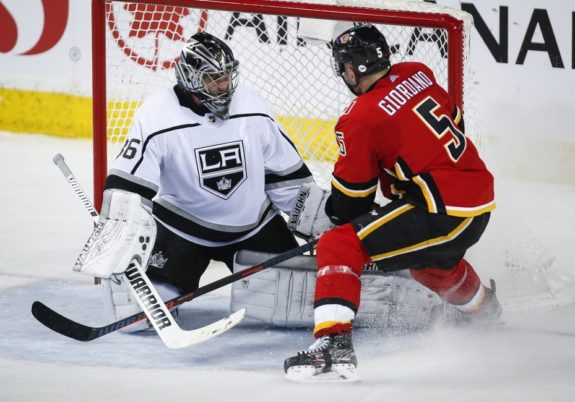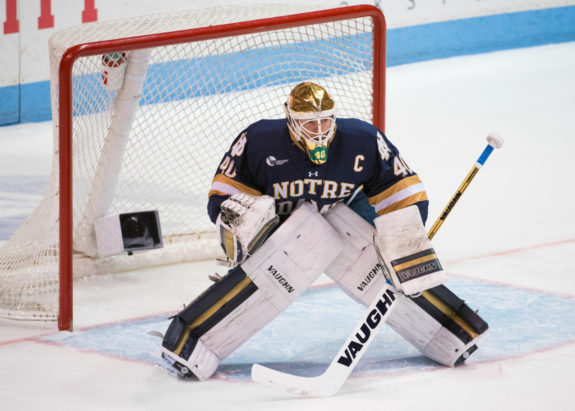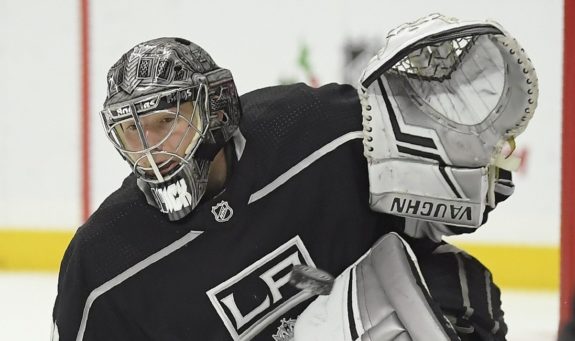The Jonathan Quick succession plan has been set in motion, with the Los Angeles Kings re-signing 24-year-old third-stringer Cal Petersen to a three-year deal.
Petersen vs. Campbell
Maybe “third-stringer” isn’t an accurate description of what Petersen means to the Kings, though. Arguably one of the league’s top 10 goalie prospects, Petersen is technically third in line to the so-called throne. And, in all fairness, Jack Campbell has performed admirably as Quick’s backup over the last few seasons, as one of the best in the league in his own right.

Where things get tricky is with regard to Quick’s contract status. The 27-year-old does have the pedigree to take over for Quick as a 2010 first-round pick (No. 11 by the Dallas Stars). However, Campbell’s been a late bloomer. He only established himself as an NHL regular as late as this season, when he made 31 appearances in relief of an injured Quick (.928 save percentage), whose durability has come into question in recent seasons.
As a result, with Campbell’s contract running out at the end of this coming season, the Kings may not feel entirely comfortable rolling the dice on him and locking up the pending unrestricted free agent into the long term. In Petersen, who’s two and a half years younger than Campbell, they’re at the very least securing an above-average backup for Quick until 2022.
Quick Can’t Fight Father Time
In fact, one could make the argument that Petersen is just as established as Campbell. He got in 11 games this past season, as Campbell went down with a knee injury, too. Going 5-4-1 with a 2.61 goals-against average and .924 save percentage, Petersen affirmed the Kings’ faith in him, after they signed the ex-Buffalo Sabres draft pick (No. 129 in 2013) a few seasons ago. Petersen effectively snubbed the Sabres to sign with the Kings, giving them what few probably saw at the time as an embarrassment of riches in net.

The signing came after the 2016-17 season, during which Quick had been limited to just 17 games. So, it must have been at least somewhat of calculated decision by general manager Dean Lombardi, even if Quick’s performance in the games he did get in upon his return didn’t show he was any worse for wear. That season he went 8-5-2 with a 2.26 GAA and .917 save percentage.
However, now with Quick at age 33 and a horrible season behind him, the initial Petersen signing looks genius. There are obviously few guarantees with regard to how Petersen performs from here on out, but, following a horrid 16-23-7, 2018-19 season (3.38 GAA, .888 save percentage) on the part of Quick, the writing may be on the wall.
Quick Not Necessarily Done
Oh, Quick will obviously get the opportunity to redeem himself. After all, he is under contract until 2023. However, with the next expansion draft coming up in 2021, one has to believe it may very well be to showcase him for the new Seattle franchise and hope they do them a solid. As NHL teams will be able to protect one goalie, there’s little reason it won’t end up being Petersen instead of Quick at the end of the day.

There’s no denying Quick has by and large lived up to his end of the bargain when he signed his massive 10-year, $58 million contract back in the day. While Quick’s deal may have been seen as less-than-stellar in the wake of his horrible campaign this past season, to put it in perspective, he was well-compensated for the Stanley Cup and Conny Smythe Trophy he had just won. Not only that, but he also contributed a great deal to another championship a few seasons later, coincidentally the first season the decade-long deal came into effect.
It’s safe to say, as radical of a move signing Quick on for a decade was, the Kings have had to deal with worse contracts since, by a wide margin. So, if it so happens Quick is no longer up to being an elite goalie, the Kings can probably live with it, considering what they gained in exchange, especially if the two championships he won had something to do with Petersen’s decision.
Not-so-fun fact: The Kings drafted goalie Jonathan Bernier in the first round of the 2006 NHL Entry Draft, not really knowing what they already had in Quick, before he even played a game for them. That’s what happens sometimes, in that the goalie you envision as the team’s future workhorse doesn’t pan out. In Petersen’s case, as an ex-Sabres pick, he’s arguably just as much found money as Quick. Now he’s got the bankroll to prove it.
It’s admittedly a modest contract, with an average annual value of under $900,000. He’s also scheduled to become an unrestricted free agent at the end of it. So, was Quick at the end of his previous deal, though. The goal must be not to let it get to that point with Petersen. Assuming they’ve got in him what the hockey world believes they do, it won’t.